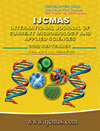


 National Academy of Agricultural Sciences (NAAS)
National Academy of Agricultural Sciences (NAAS)

|
PRINT ISSN : 2319-7692
Online ISSN : 2319-7706 Issues : 12 per year Publisher : Excellent Publishers Email : editorijcmas@gmail.com / submit@ijcmas.com Editor-in-chief: Dr.M.Prakash Index Copernicus ICV 2018: 95.39 NAAS RATING 2020: 5.38 |
Small and marginal farmers are core to the Indian rural economy, constituting 86.2 percent to the farming community and possessing 47.3 percent of the total operational land. To handle the challenges to the labour oriented country like India, where farmers are even not able to earn their livelihood as they pay for all their inputs to the market for seeds, fertilizers, pesticides, energy, feed labour etc. The evolution and adoption of situation specific IFS module has enabled us to develop a framework for sustenance and economically feasible farming operation comparable to large sized single entrepreneur holdings. Under IFS an interrelated set of agri-entrepreneurs compatible to particular agri-ecological situation are tested and adopted so that the waste/ by product of an entrepreneur becomes resource for other, which reduces cost, improves production, enhances environmental quality, farm employment and farm income. After the trails conducted by AICRP on IFS, it has been found that the farm profitability may be increased from 3 to 5 times as compared to traditional farming. Multi-component farming is the way of efficient resource recycling within the system with increased economic profitability, production, sustainability and preserving environmental quality and maintaining biodiversity, helps for efficient utilization of natural resources and also may be potential tool to combat flood and drought.
 |
 |
 |
 |
 |